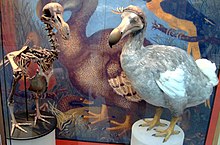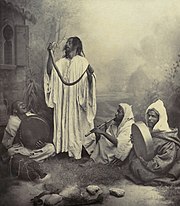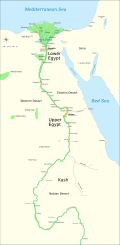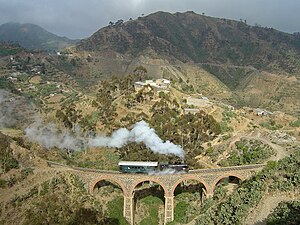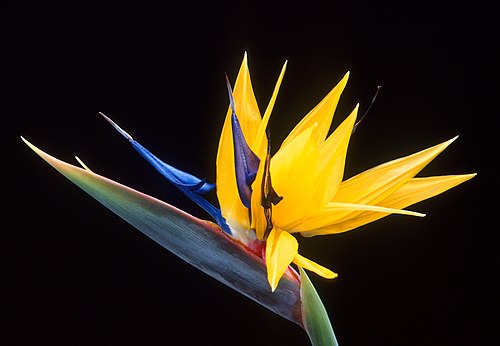Portal:Africa



Africa is the world's second-largest and second-most populous continent after Asia. At about 30.3 million km2 (11.7 million square miles) including adjacent islands, it covers 20% of Earth's land area and 6% of its total surface area. With nearly 1.4 billion people as of 2021, it accounts for about 18% of the world's human population. Africa's population is the youngest among all the continents; the median age in 2012 was 19.7, when the worldwide median age was 30.4. Based on 2024 projections, Africa's population will reach 3.8 billion people by 2099. Africa is the least wealthy inhabited continent per capita and second-least wealthy by total wealth, ahead of Oceania. Scholars have attributed this to different factors including geography, climate, corruption, colonialism, the Cold War, and neocolonialism. Despite this low concentration of wealth, recent economic expansion and a large and young population make Africa an important economic market in the broader global context. Africa has a large quantity of natural resources and food resources, including diamonds, sugar, salt, gold, iron, cobalt, uranium, copper, bauxite, silver, petroleum, natural gas, cocoa beans, and.
Africa straddles the equator and the prime meridian. It is the only continent to stretch from the northern temperate to the southern temperate zones. The majority of the continent and its countries are in the Northern Hemisphere, with a substantial portion and a number of countries in the Southern Hemisphere. Most of the continent lies in the tropics, except for a large part of Western Sahara, Algeria, Libya and Egypt, the northern tip of Mauritania, and the entire territories of Morocco, Ceuta, Melilla, and Tunisia, which in turn are located above the tropic of Cancer, in the northern temperate zone. In the other extreme of the continent, southern Namibia, southern Botswana, great parts of South Africa, the entire territories of Lesotho and Eswatini and the southern tips of Mozambique and Madagascar are located below the tropic of Capricorn, in the southern temperate zone.
Africa is highly biodiverse; it is the continent with the largest number of megafauna species, as it was least affected by the extinction of the Pleistocene megafauna. However, Africa also is heavily affected by a wide range of environmental issues, including desertification, deforestation, water scarcity, and pollution. These entrenched environmental concerns are expected to worsen as climate change impacts Africa. The UN Intergovernmental Panel on Climate Change has identified Africa as the continent most vulnerable to climate change.
The history of Africa is long, complex, and varied, and has often been under-appreciated by the global historical community. In African societies the oral word is revered, and they have generally recorded their history via oral tradition, which has led anthropologists to term them oral civilisations, contrasted with literate civilisations which pride the written word. During the colonial period, oral sources were deprecated by European historians, which gave them the impression Africa had no recorded history. African historiography became organized at the academic level in the mid-20th century, and saw a movement towards utilising oral sources in a multidisciplinary approach, culminating in the General History of Africa, edited by specialists from across the continent. (Full article...)
Selected article –
The dodo (Raphus cucullatus) is an extinct flightless bird that was endemic to the island of Mauritius, which is east of Madagascar in the Indian Ocean. The dodo's closest relative was the also-extinct and flightless Rodrigues solitaire. The two formed the subfamily Raphinae, a clade of extinct flightless birds that were a part of the family which includes pigeons and doves. The closest living relative of the dodo is the Nicobar pigeon. A white dodo was once thought to have existed on the nearby island of Réunion, but it is now believed that this assumption was merely confusion based on the also-extinct Réunion ibis and paintings of white dodos.
Subfossil remains show the dodo measured around 62.6–75 centimetres (2.05–2.46 ft) in height and may have weighed 10.6–17.5 kg (23–39 lb) in the wild. The dodo's appearance in life is evidenced only by drawings, paintings, and written accounts from the 17th century. Since these portraits vary considerably, and since only some of the illustrations are known to have been drawn from live specimens, the dodos' exact appearance in life remains unresolved, and little is known about its behaviour. It has been depicted with brownish-grey plumage, yellow feet, a tuft of tail feathers, a grey, naked head, and a black, yellow, and green beak. It used gizzard stones to help digest its food, which is thought to have included fruits, and its main habitat is believed to have been the woods in the drier coastal areas of Mauritius. One account states its clutch consisted of a single egg. It is presumed that the dodo became flightless because of the ready availability of abundant food sources and a relative absence of predators on Mauritius. Though the dodo has historically been portrayed as being fat and clumsy, it is now thought to have been well-adapted for its ecosystem. (Full article...)
Featured pictures –
Did you know (auto-generated) -

- ... that British communist leader Trevor Carter was the stage manager for the first British-Caribbean carnival, held in St Pancras Town Hall?
- ... that after erecting the African Union headquarters, the Chinese government was accused in 2018 of spying on the building for five years?
- ... that police in Indianola, Mississippi, shot an unarmed 11-year-old African-American boy after responding to his 9-1-1 call for help at his home?
- ... that Dominion: An Anthology of Speculative Fiction From Africa and the African Diaspora was partly inspired by The 1619 Project?
- ... that in 1948, Thomas Yarborough became the first African American to be elected as a city council member in California?
- ... that the pulse stops during the soliloquy of In C Mali?
Categories
Selected biography –
Daniel Toroitich arap Moi CGH (/ˈmoʊiː/ MOH-ee; 2 September 1924 – 4 February 2020) was a Kenyan politician who served as the second president of Kenya from 1978 to 2002. He is the country's longest-serving president to date. Moi previously served as the third vice president of Kenya from 1967 to 1978 under President Jomo Kenyatta, becoming the president following the latter's death.
Born into the Tugen sub-group of the Kalenjin people in the Kenyan Rift Valley, Moi studied as a boy at the Africa Inland Mission school before training as a teacher at the Tambach teachers training college, working in that profession until 1955. He then entered politics and was elected a member of the Legislative Council for Rift Valley. As independence approached, Moi joined the Kenyan delegation which travelled to London for the Lancaster House Conferences, where the country's first post-independence constitution was drafted. In 1960, he founded the Kenya African Democratic Union (KADU) as a rival party to Kenyatta's Kenya African National Union (KANU). Following independence in 1963, Kenyatta who became Prime Minister and later President of the new nation, convinced Moi to merge the two parties. Kenyatta appointed Moi to his government in 1964 and then promoted him to vice-president in 1967. Despite opposition from a Kikuyu elite known as the Kiambu Mafia, Kenyatta retained Moi as his Vice President. Moi took over as president when Kenyatta died in 1978. (Full article...)
Selected country –
 |
 |
||
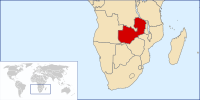
| |||
Zambia, officially the Republic of Zambia (formerly Northern Rhodesia), is a landlocked country in Southern Africa. It borders the Democratic Republic of the Congo to the north, Tanzania to the north-east, Malawi to the east, Mozambique, Zimbabwe, Botswana, and Namibia to the south, and Angola to the west.
Zambia's politics takes place in a framework of a presidential representative democratic republic, whereby the President of Zambia is both head of state and head of government in a multi-party system. Executive power is exercised by the government. Legislative power is vested in both the government and parliament.
The official language is English, used to conduct official business and is the medium of instruction in schools. Commonly-spoken indigenous languages include the 7 major languages: Chibemba, Chinyanja, Lunda, Chitonga, Kaonde, Silozi and Luvale. (Read more...)
Selected city –
Benghazi (/bɛnˈɡɑːzi/) (lit. Son of [the] Ghazi) is the second-most-populous city in Libya as well as the largest city in Cyrenaica, with an estimated population of 859,000 in 2023. Located on the Gulf of Sidra in the Mediterranean, Benghazi is also a major seaport.
A Greek colony named Euesperides had existed in the area from around 525 BC. In the 3rd century BC, it was relocated and refounded as the Ptolemaic city of Berenice. Berenice prospered under the Romans, and after the 3rd century AD it superseded Cyrene and Barca as the centre of Cyrenaica. The city went into decline during the Byzantine period and had already been reduced to a small town before its conquest by the Arabs. After around four centuries of peaceful Ottoman rule, in 1911, Italy captured Benghazi and the rest of Tripolitania from the Ottoman Empire. Under Italian rule, Benghazi witnessed a period of extensive development and modernization, particularly in the second half of the 1930s under the Italian Libya colony. The city changed hands several times during World War II and was heavily damaged in the process. After the war Benghazi was rebuilt and became the co-capital of the newly independent Kingdom of Libya. Following the 1969 coup d'état by Muammar Gaddafi, Benghazi lost its capital status and all government offices relocated to Tripoli. (Full article...)
In the news
- 12 February 2024 –
- Two boats collide on the Congo River near Kinshasa, Democratic Republic of the Congo; with the death toll remains unclear. (AP)
- 11 February 2024 – 2023 Africa Cup of Nations
- In association football, hosts Ivory Coast win their third Africa Cup of Nations by defeating Nigeria 2–1 in the final. Sébastien Haller scores the winning goal in the 81st minute. (The Guardian)
- 10 February 2024 – Somali civil war
- Four Emirati soldiers and a Bahraini military officer are killed, while ten other people are injured, when a soldier opens fire at a military base in Mogadishu, Somalia, before being killed in the ensuing shootout. Al-Shabaab claims responsibility. (AP)
- 10 February 2024 –
- A Eurocopter EC130 helicopter crashes near Nipton, California, United States, killing all the six people on board, including Nigerian banker Herbert Wigwe. (CBS News)
- 10 February 2024 – 2023–2024 Senegalese protests
- Violent protests occur in Senegal following an announcement by President Macky Sall that presidential elections have been delayed from February 25 to December 15. (Sky News)
- 9 February 2024 –
- At least 18 people are killed during a collision between a bus and a truck on a road in Kinshasa, Democratic Republic of the Congo. (AP)
Updated: 16:33, 14 February 2024
General images -
Africa topics
More did you know –
- ... that Dutch malacologist Adolph Cornelis van Bruggen is an expert in African land snails?
- ... that a 20‑day study reported by BirdLife International discovered 265 species of birds in Nki National Park?
- ... that Kalulu, an African boy who died in 1877, was modeled in Madame Tussauds and attended Dr. Livingstone's funeral in London?
- ... that Samuel Jackman Prescod became the first person of African descent elected to the Parliament of Barbados?
Related portals
Major Religions in Africa
North Africa
West Africa
Central Africa
East Africa
Southern Africa
Associated Wikimedia
The following Wikimedia Foundation sister projects provide more on this subject:
-
Commons
Free media repository -
Wikibooks
Free textbooks and manuals -
Wikidata
Free knowledge base -
Wikinews
Free-content news -
Wikiquote
Collection of quotations -
Wikisource
Free-content library -
Wikispecies
Directory of species -
Wikiversity
Free learning tools -
Wikivoyage
Free travel guide -
Wiktionary
Dictionary and thesaurus

